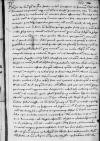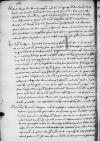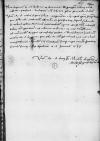Tametsi tunc quando Vestrae Reverendissimae Dominationis germanus ⌊Lanciciae⌋ apud nos fuit atrocissimo frigore correpti quadamque lassitudine gravati non omnia exacte de rebus, quae in ⌊Dania⌋ aut ⌊Lubeca⌋ cum Holsato principe gesta sunt et a Vestra Reverendissima Dominatione missa perlegeramus, tamen ad locum quietiorem pervenientes diligentius perlegimus et recensuimus. Quae qualia illa sunt, quae geruntur, iam Vestra Reverendissima Dominatio prudentia sua, dubio procul, ponderavit et quorsum tendant possibilibus coniecturis consecuta est, et plurimum laudamus Vestrae Reverendissimae Dominationis vigilem sollicitudinem, qua movetur, ne ea mala aliquando dum aliis occupati erimus, in iacturam regni ad nos transferantur. Quia tamen praevisa sagitta minus laedit, suasimus nos, ut Vestra Reverendissima Dominatio sacrae ⌊maiestati regiae⌋ ea omnia simul cum consilio suo patefaceret, ut sua maiestas Vestram Reverendissimam Dominationem tanto maiori affectu suae gratiae asciret, quanto intelligeret ipsam esse curiosam et vigilem in rebus suis et dominiorum suorum. Novit enim Vestra Reverendissima Dominatio, cum ageret apud ⌊caesarem⌋, eius scripta suae maiestati semper grata fuisse, maluit enim sua maiestas scire res exoticas a fonte quam a rivis, et ideo Vestra Reverendissima Dominatio frequentius suae maiestati scribat. Sed nos, qui ratione partim partimque rerum experientia dirigimur, nihil tale metuimus in nostrum malum inde oriturum, quia istorum foedera semper mutantia comperta sunt et nunc ex ⌊Vratislavia⌋ novum huc allatum est ⌊regem Angliae⌋ cum ⌊caesare⌋ foedus inisse et consortem primam ad torum revocasse quodque caesar relicto filio in ⌊Hispania⌋ ad septennium cum consorte in ⌊Germaniam⌋ venturus sit exercitus comparaturus. Aestas tamen futura ea mirabilia, quae contecta iacent, evome{bi}t. Nam et ⌊caesar⌋ et serenissimus ⌊rex Romanorum⌋ ad magna aspirant, classes et exercitus comparando. Quibus ⌊sanctissimus dominus noster⌋ nullum impedimentum faciet, sed concordiae tramites magna pietate custodiet, licet huc sine dubio curaturus est, ut primum aliqua in religione sic confusa fiat reformatio. Eadem enim facta, omnia reliqua cum honore et gloria ex sententia cedent.
Habet ⌊rex Romanorum⌋ in ⌊Hungaris⌋ exercitum ad quinque milia hominum. Nam hodie ex ⌊Cracovia⌋ litteras habuimus, quid praetendat, suspicio est, praesertim cum multi ⌊Hungari⌋ ad ⌊Ferdinandum⌋ deficiant, ⌊Lasky⌋ iam liberatus a carcere, cum dominis castellano Cracoviensi et palatino Russiae ad ⌊regem Iohannem⌋ ⌊Varadinum⌋ profectus est, ut illic recipiat condiciones suae manumissionis, durae enim condiciones, et suae condicioni impossibiles primum datae fuere, quales vero hae ultimae erunt, sciemus postea, quia nihil occultum est, quod non reveletur.
Hic dominus Casper creatus canonicus in ecclesia Vestrae Reverendissimae Dominationis Culmensi venit ad nos cum iuribus suis, quae habet ab antecessore Vestrae Reverendissimae Dominationis et per Vestram Reverendissimam Dominationem confirmatis, supplicans, ut pro eodem ad Vestram Reverendissimam Dominationem intercederemus, quod eius gratia assequatur canonicatum et praebendam Culmensem, quae paulo ante vacavit et de eadem Vestra Reverendissima Dominatio providerit, ipso et ipsius iure neglecto, cuidam suo familiari. Ius siquidem ipse, ex quo creatus est, bonum habet et licet in mense pontificis vacaverit, retinere eam praebendam potest, Vestrae autem Reverendissimae Dominationis provisus eam retinere non poterit, ita enim ex iuribus suis coram nobis exhibitis colligimus. Atque ideo commendamus iustitiam eius Vestrae Reverendissimae Dominationi, nam plana est, velit gratia et ope sua ipsum in canonicum recipere et sua coadiutoria, quam habet ad alium canonicatum, sit in potestate Vestrae Reverendissimae Dominationis. Rem enim aequam et iustam faciet, et fomitem litibus submovebit. Nam vir maturus est et doctus quam poterit ecclesiae prodesse, ut cognoscat nostram intercessionem sibi ex usu esse.
⌊Magistratus Toronensis⌋ nuper nobis rescripsit citans Vestram Reverendissimam Dominationem in testem, quod omnia providet et curet in ea civitate, quae ad cultum divinum et religionem sunt, ita bene et dextere, ut nihil desiderandum sit, suorum maiorum observationi vetustae et bonis exemplis inhaerendo. Quodque sacerdotes probos debito honore afficiant, ut caerimonias vetusto usu habitas sine ulla diminutione asservent, inquientes, quod Vestra Reverendissima Dominatio nequaquam ut eorum pastor aliud pateretur. Si ita est, ut dicunt, laudamus, et eis gratulamur.
Non laxentur tamen eis habenae in deterius, et Georgium scribam miro affectu excusant, resipiscere enim deberet priori periculo doctus.
Vestra Reverendissima Dominatio nobis saepius scribat, argumenta enim apud ipsam frequentia, quae scribendi materiam offerent et praesertim si quid subinde de rebus ultramarinis innovabitur, quia utique nostra interest talia non ignorare, ex aliena cudina in nos transferri ad incommodum regni ex insidiis posset. Deus servet incolumem Vestram Reverendissimam Dominationem longaeve, quae sibi de nobis persuadeat, ut nos alias comprobavit. Eandem enim caritatem semper erga eandem servaturi firmiter sumus.



